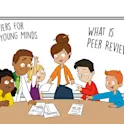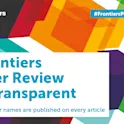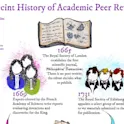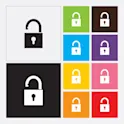
Young Minds
10 Sep 2018
Taking inclusion in peer review to a new level
Why we involve kids and teens in the peer review of scientific articles – Diversity & Inclusion during Peer Review Week 2018

Young Minds
10 Sep 2018
Why we involve kids and teens in the peer review of scientific articles – Diversity & Inclusion during Peer Review Week 2018

Young Minds
31 May 2018
Shaking in their lab coats: young students of the Brain Explorer Academy give scientists feedback during a live peer review event.

Frontiers news
26 Feb 2018
The new digital tool for Frontiers authors, editors and reviewers further facilitates rapid publication of high-quality research.

Frontiers news
12 Sep 2017
Transparency is the central theme of Peer Review Week 2017, we highlight how we raise the standard for transparency in Frontiers peer review

Frontiers news
20 Sep 2016
Frontiers’ founding principle is to empower researchers in the publishing process. We distribute editorial responsibility to our Editorial Boards, to which we appoint leading experts according to strict criteria of excellence.

Open science and peer review
15 Sep 2016
Although peer review is now a fundamental quality control measure implemented during the publishing process, the practice as we know it today is quite different from how it was envisioned almost two centuries ago. PDF version available here: A Succinct History of Academic Peer Review References Csiszar, A. (2016) Peer review: Troubled from the start. Nature 532:306-8 doi:10.1038/532306a Spier, R. (2002) The history of the peer-review process. Trends in Biotechnology 20(8):357-8 doi: 10.1016/S0167-7799(02)01985-6

Open science and peer review
27 Jan 2016
In addition to the basic services all OA publishers provide, Frontiers has developed 14 premier services to offer a more service-orientated approach to scholarly publishing.

Open science and peer review
19 Jun 2015
Selected news, views and information on Open Science and scholarly publishing from the past week

Open science and peer review
12 Jun 2015
Selected news, views and information on Open Science and scholarly publishing from the past week

Open science and peer review
08 Jun 2015
Selected news, views and information on Open Science and scholarly publishing from the past week

Open science and peer review
22 May 2015
Selected news, views and information on Open Science and scholarly publishing from the past week Chronicle of Higher Education ‘We need to take a look at the data’: how 2 persistent grad students upended a blockbuster study New York Times Retraction sought in study on views of gay marriage Science Open-access publisher sacks 31 editors amid fierce row over independence Frontiers Blog Frontiers acts to defend distributed editorial independence The Conversation Publisher pushback puts open access in peril Research Information Elsevier rebuffs COAR/SPARC criticism of sharing and hosting policy Retraction Watch What should an ideal retraction notice look like? Frontiers in Ecology and Evolution Blind trust in unblinded observation in Ecology, Evolution, and Behavior BioMed Central blogs The future of peer review NY Times Fake diplomas, real cash: Pakistani company Axact reaps millions Boston Globe The exploitative economics of academic publishing Library Journal U. Minnesota Press, CUNY grad center develop hybrid publishing platform University of Delaware University of Delaware Library joins COAPI open access coalition Campus Technology CU Boulder adopts Open Access BBC Ocean’s hidden world of plankton revealed in ‘enormous database’ BBC Opal citizen science project expands across the UK University World News Major research trends – clustered, international, […]

Open science and peer review
20 May 2015
Selected news, views and information on Open Science and scholarly publishing from the past week The Guardian Will traditional science journals disappear? Fusion This scientific paper has 2,863 authors. How? BBC Top science panel to advise European Commission BioMed Central Blogs A beginner’s guide to peer review: Part One Manchester Evening News University of Manchester spends more on journal subscriptions than any other institution in UK Research Information An academic approach to sales and marketing in publishing The Guardian Will traditional science journals disappear? Wired Why publishers should not fear Facebook’s content megacity Harvard Gazette Robert Darnton closes the book Publishers Weekly The changing face of STM publishing University of New Mexico News UNM Libraries opens the digital door to a treasury of information The Guardian Super-scholars: MPAA offers $20,000 for academic research in copyright battle Library Journal Why internet searches are not enough | peer to peer review BioMed Central blog Gigascience pushes metabolomics Open Data & training Universität München Ein neues Modell des Publizierens

Open science and peer review
05 Oct 2014
By Carl Senior By encouraging the generation of a co-authored commentary both the reviewer and the author can work together in a collegial and constructive environment to expand personal networks and in turn support the continued development of science. The Frontier’s portfolio continues to expand and as it does our innovative review strategy is being recognised more and more as being at the very edge of cutting-edge innovation. Recently such innovation was recognised with the prestigious Gold Award from the Association of Learned and Professional Society Publishers (ALPSP). Such a recognition acknowledges the most innovative strategies that support the open-access publication process and those individuals who drive it forward. Indeed, in receiving the award Professor Kamila Markram dedicated it to the community of open-access researchers who support the Frontier’s process and noted that ‘…their continued dedication and faith in the Frontier’s open-science platform that is helping to transform scholarly publishing and the dissemination of articles in the Internet era’ (Markram, 2014). Yet even with the acknowledgement of the ALPSP Gold Award we should not stand idle but continue to expand the boundaries of innovation. This is especially relevant for the more ‘junior’ journals in the Frontier’s canon such as Frontiers […]

Frontiers news
12 Feb 2014
Frontiers is pleased to announce the release of its new, revolutionary Interactive Review Forum with enhanced features and upgraded software to enhance and ease the collaborative dialogue between authors and reviewers. The Review Forum is part of the Frontiers Open Science platform that empowers scientists to advance the way research is evaluated, communicated and shared in the digital era. Introduced in 2007, Frontiers’ peer review enables a collaborative dialogue online in real-time between authors and reviewers, with an associate editor as moderator. The final decision is based on consensus about objective issues between reviewers and editors, who are named on the final publication to acknowledge their valuable contribution and ensure transparency. Acting like a personal Web 2.0 assistant, the Review Forum guides authors, reviewers and editors smoothly through the process and alerts them when action is required. The system minimizes delay and speeds up the review, shortening the average time to only 84 days. Handy new features make it easier to manage the review process and ensure that it progresses smoothly. Editors can easily browse the most relevant reviewer profiles based on keywords, and send invitations with the click of a button. A timeline reassures authors by keeping them informed on […]

Frontiers news
22 Oct 2013
Open Letter to the Frontiers Editorial Boards On October 4, Science magazine published a news item describing the submission of a fake research article to more than 250 open-access journals, resulting in 60% of journals accepting the article after virtually no peer review. The study aimed at representing a “first global snapshot of peer review across open-access”: http://www.sciencemag.org/content/342/6154/60.full The fake article was also submitted to Frontiers. In our case, the Specialty Chief Editor of the relevant section rejected the article the same day it was submitted following an initial scan for content, exactly in keeping with the high-quality control that Frontiers has put in place. Indeed, one of the reasons why Frontiers was founded was to fix the many problems of traditional peer review, which we achieve by: 1. Appointing only top-notch researchers and clinicians to our boards to ensure quality; 2. Introducing standardized review questionnaires that enforce in-depth and rigorous reviews; 3. Creating the interactive “Review Forum” which opens a direct dialogue between authors, reviewers and editors, allowing not only the editor, but also the reviewers to see and participate in each other’s reviews; 4. Requiring reviewers and editor to reach a consensus and take a unanimous decision; 5. Publishing the names of the reviewers […]
Get the latest research updates, subscribe to our newsletter